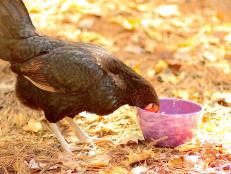How to Increase Chickens' Winter Egg Production


Under ideal conditions, it takes a chicken about 25 hours to produce one egg. For those new to chicken keeping, it can be astonishing how many eggs a small flock can provide and it seems like the bounty will never end. Then the weather gets colder. And the days shorter. Six eggs a day become four. Then three. Then two. What happens to egg production when winter rolls around?
Turns out, chickens are built for survival. Hormones required for laying are wired to daylight hours and as the days grow shorter, fewer eggs will be laid. Laying eggs takes a lot of energy and this internal regulator will not only allow chickens to survive during periods when food may be less readily available, it decreases the possibility of winter hatchlings less likely to survive in harsh conditions.
For those chickens living the good life in your backyard, food and water are plentiful, they are protected from the elements by their very own coop, and for most of us, the absence of a rooster makes winter hatchlings a non-issue. So what can be done to get the girls back to the business of laying eggs?
While it’s not nice to fool Mother Nature, in this case we’ll make an exception. Here are a few tips for keeping egg production up during the winter months.
Provide Artificial Daylight
Use a low wattage light bulb in the coop. Extending the hours chickens are exposed to light is often enough to increase egg production. A timer is recommended to limit light to 16 hours. Extending light exposure beyond that may cause hormone production to shut down entirely, meaning spring egg production will be negatively affected.
Increase Protein
Change or supplement the feed provided to your chickens. Higher protein intake will increase the core temperature of laying chickens, improving their ability to produce eggs.
Provide Scratch Grains
Scratch grains encourage feeding habits and supplement protein. While scratch grains are not a replacement for conventional feed, it is an easy way to boost protein intake.
Free Range Your Chickens
Do this during daylight hours, if possible. Exposure to natural daylight helps keep those hormones pumping and ranging gives chickens an opportunity to exercise, which also improves egg production.
Wait for Spring
Natural recovery periods can help to improve the overall health of laying chickens. During times of molting or brooding, egg production will stop to allow energy to be redirected to other endeavours. While well-maintained chickens probably don’t need to take the winter off, they may appreciate the break.
Even if your goal isn’t increased egg production, make sure to keep your backyard brood sufficiently fed and watered during winter months to keep core temperatures up. Eggs or not, it’s chilly out there!













































